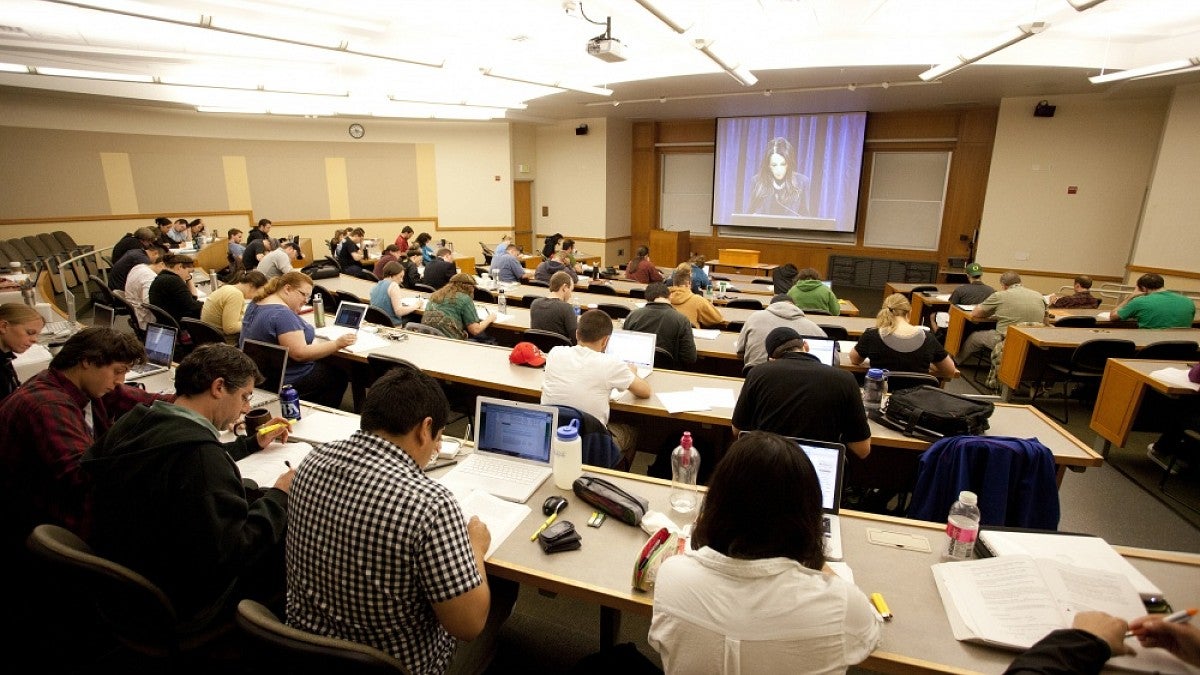The natural cycle of learning and teaching defines the life of University of Oregon graduate teaching fellows: While they’re ultimately here to learn and work toward a degree, they often fulfill a teaching appointment alongside their studies.
As both students and teachers, graduate teaching fellows are positioned to know that teaching is always about learning — and that’s where the UO Teaching Effectiveness Program’s new Graduate Teaching Initiative comes in.
As of last month, nearly 90 graduate students have enrolled in the program since its establishment in fall 2015.
The optional initiative helps graduate students hone their teaching skills and build a community of support through workshops, teaching consultations, classroom observations, portfolio development and other requirements.
“There are always things I get stuck on, things I feel I need to work on as a teacher,” said Mona Tougas, a graduate student studying and teaching comparative literature. “So the more support and feedback I can get, the better.”
Tougas, now in her sixth and final year as a grad student and a winner of a teaching award for her work to mentor peers, has constantly looked for ways to improve her teaching abilities. Now, with the establishment of the Graduate Teaching Initiative, she’s able to work with other grad students and faculty to develop those skills through a single program.
“The idea with the initiative was to improve TEP’s services and organize them into a coherent pathway for students,” said Lee Rumbarger, director of the Teaching Effectiveness Program. “As graduate students start to develop more and more, they get a sense of what their guiding teaching philosophy is and how that helps them make decisions day to day.”
The teaching initiative will require students to complete a series of core requirements focused on individual and small-group teaching activities, drafting a teaching portfolio, observing classes taught by faculty and peers and attending various workshops and community discussions. Ultimately, the program builds on existing teacher training opportunities offered by many academic departments.
“At the UO, we do so much teaching — and a lot of the time, (graduate students at) Ivy League schools and other schools don’t — so this is a chance to document the time we teach,” Tougas said. “That’s why I think this initiative is so valuable, because it makes the grad program at the UO different.”
Echoing Tougas’ sentiment is fellow graduate student Eleanor Wakefield, who teaches literature and English composition in addition to her studies. Beyond the benefits of earning a certificate, Wakefield enjoys the collaborative aspects of the initiative.
“The GTI seemed like such a great idea to help me learn and develop more. And then with the certificate, it’ll show future employers that good teaching is something I care about and have worked on,” she said. “I also liked the idea of learning from people in other disciplines and meeting new people.”
Those who take the initiative have two options: They can complete the basic requirements and earn a standard certificate of completion, or they can create a special project — for example, devising an original course or publishing an academic paper on their teaching — and earn an advanced certificate of completion.
The process is designed to be flexible, but it will typically take graduate students at least three terms to complete the requirements for either certificate.
“I think the structured but flexible program lets me be reflective and inquisitive about my teaching without overwhelming me or exhausting me, which is great, since I'm busy teaching and being a student,” Wakefield said.
By the end of their programs, graduate students have practiced a variety of skills that will serve them as future faculty, skills that will prove useful in other professional fields and work environments as well.
“We have a really vibrant teaching community here with our grad students,” said Shane Hall, a graduate teaching fellow and one of the lead organizers of the initiative. “It’s a hypercompetitive academic job market out there, so we thought that it would benefit our students to get this extra recognition and support.”
More information and an enrollment application are available online.
“I hope that the program empowers graduate students to feel like they can make positive experiments with their teaching and find an increased amount of joy and community in their teaching,” Rumbarger said. “Graduate students can be powerful models for undergraduates of what it means to follow the life of the mind.”
— By Nathaniel Brown, Public Affairs Communications


